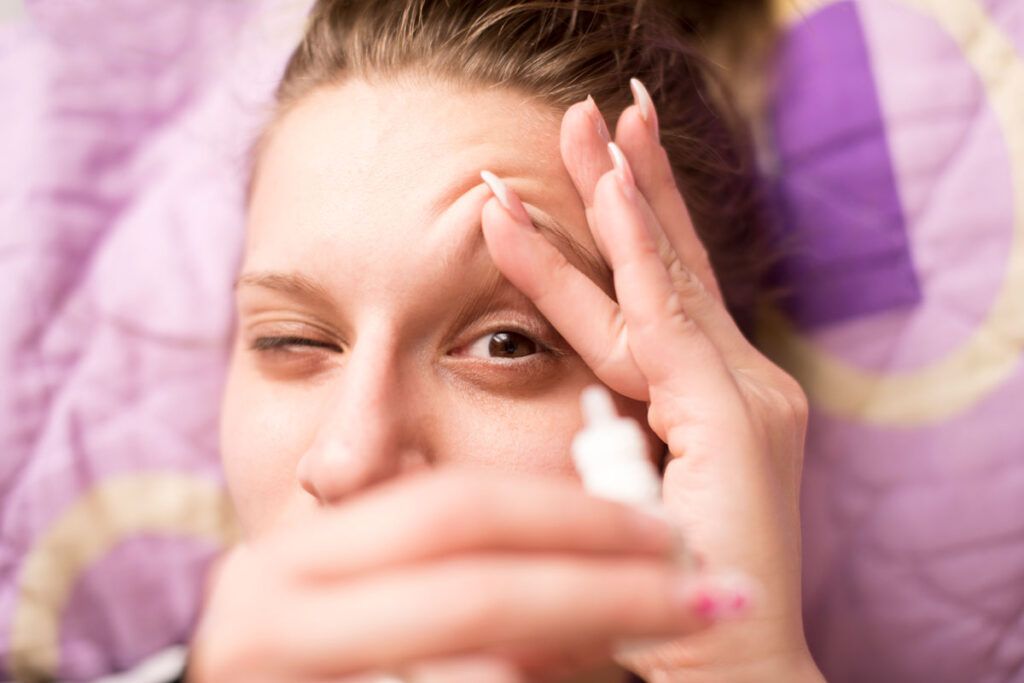Dry eyes can lead to changes in your vision, such as blurry vision. When not treated, it can cause serious damage to your eyes.
About 20 million people in the United States have dry eyes. The causes of this condition can vary, from dry eye syndrome to environmental and lifestyle factors like staring at screens for longer periods of time. Dry eyes can be chronic or temporary.
Knowing more about the connection between dry eyes and blurry vision, the causes, and treatment options can help you manage your condition.
How do dry eyes cause blurry vision?

Normally, your eyes produce a film of tears that helps protect your cornea. The cornea focuses light into your eyes so your brain can translate light signals into images.
When your eyes don’t produce enough tears, or your tears dry out more quickly, your cornea is affected and can’t adequately focus light, leading to blurry vision.
Other symptoms of dry eye are:
- eye irritation
- sensitivity to light
- a feeling that you have something stuck in your eyes
- itchiness in your eyes
- watery eyes
- redness
Causes of dry eyes
Dry eyes can be a symptom of health conditions, or they can be due to environmental, genetic, and lifestyle factors. They may also be a side effect of medication.
Some conditions that can lead to dry eyes include:
- Dry eye syndrome (chronic dry eyes): Dry eye syndrome happens when dryness in the eyes persists after a change in the environment or if a lifestyle factor is a trigger. It can last for weeks or months, and it may stop for a while only to come back again later.
- Blepharitis: Blepharitis is the inflammation of the eyelids and can cause dry eyes.
- Sjögren syndrome: Sjögren syndrome is an autoimmune condition that affects the glands that produce tears and saliva. Because it changes how the tear glands function, it can lead to dry eyes.
- Lupus: Lupus is an autoimmune condition that causes inflammation. It can damage the tissues surrounding your eyes, leading to dry eyes. In fact, 26% of people with lupus have dry eye.
- Diabetes: Dry eye is a common symptom and complication of type 1 and type 2 diabetes. High blood sugar can cause damage to the nerves in your eyes and decrease the production of tears.
There are also some genetic risk factors that can make you more prone to dry eyes. These include:
- Sex: Females are more likely to have dry eyes due to hormonal changes during pregnancy and menopause.
- Age: Your risk of having dry eyes increases with age because of the changes in the ocular surface and tear production that come with aging. You’re more likely to develop dry eyes when you’re age 50 years or older.
Environmental factors can also cause dry eyes, such as living in a cold, dry, dusty, or windy place. Lifestyle factors that may lead to dry eyes include:
- wearing contact lenses
- staring at screens like a computer or a phone for long periods of time
- spending a long time in air-conditioned or heated places
Dry eyes can be a side effect of certain medications, such as:
- antidepressants
- lupus medication
- birth control
- antihistamines
- acne medication
- Parkinson’s disease medication
Complications of dry eyes
If not treated properly, dry eyes can lead to serious complications, including vision loss and blindness. Complications include:
- headaches
- corneal ulcers
- difficulty reading and driving
- conjunctivitis
Severe cases of dry eyes can result in blindness because untreated dry eyes can damage the cornea through scratches or an infection. Damage to the cornea is one of the leading causes of blindness.
Dry eyes can also affect your quality of life. A 2013 research review found that dry eyes affected people’s ability to perform daily tasks, decreasing their productivity and their energy. A 2020 study supports these findings.
Dry eyes treatments
You can prevent complications of dry eyes if you treat the condition early. There are several treatment options, including:
- Prescription medication: There are prescription eye drops that can help with your tear production. These include cyclosporine (Restasis) or lifitegrast (Xiidra).
- Artificial tears: These eye drops treat mild dry eye. They help moisturize your eyes. You can also use eye gels and ointments you can buy over the counter.
- Tear duct plugs: These are plugs in your tear ducts that can be temporary or more long-term (but removable).
- Medical procedures: Depending on the severity of your condition, a doctor may recommend surgery.
- Lifestyle strategies: If you have dry eyes, you can use lifestyle strategies to slow the progression of the condition and improve your symptoms. Consider:
- avoiding smoke, and windy and dusty environments
- reducing your screen time
- keeping hydrated
- sleeping 8 hours a day
- trying different brands of contact lenses (if you wear them)
GZ 6/20/23 there are surgeries to cauterize the tear duct, there are also temporary and more permanent puntal plugs to block the puntum. The permanent punctal plugs are usually removeable if necessary. (just to emphasize that puntal plugs are not surgery)
If you need help covering the cost of medications, the free Optum Perks Discount Card could help you save up to 80% on prescription drugs. Follow the links on drug names for savings on that medication, or search for a specific drug here.
